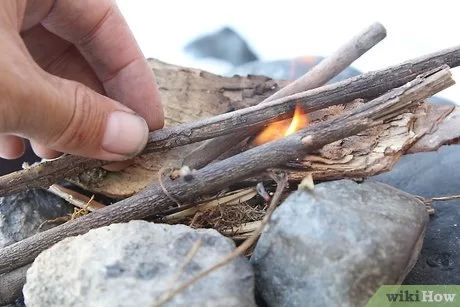Learn how to build a fire without matches or a lighter using proven survival techniques. Discover real stories, essential tips, and where to practice at Pine Cliff Resort.

- why-knowing-how-to-build-a-fire-without-matches-or-lighter-matters
- essential-materials-for-building-a-fire-naturally
- primitive-fire-starting-methods-that-actually-work
- common-mistakes-and-safety-tips-in-fire-making
- real-stories-when-fire-skills-made-the-difference
- practice-your-fire-starting-skills-at-pine-cliff-resort
1. Why Knowing How to Build a Fire Without Matches or Lighter Matters
In an era of GPS and portable gadgets, the idea of needing to start a fire without a lighter or matches might sound old-fashioned. But whether you're deep in the wilderness, dealing with a camping gear mishap, or simply looking to master essential survival skills, knowing how to build a fire naturally is a life skill every outdoor enthusiast should learn.
Fire provides warmth, light, the ability to cook, and—perhaps most importantly—a sense of control in the wild. When the sun drops and the forest gets quiet, a fire becomes more than heat—it becomes your comfort zone. If you're planning a camping trip to a place like Pine Cliff Resort, brushing up on your fire-building skills will elevate your experience and give you an edge in self-reliance.
2. Essential Materials for Building a Fire Naturally
2.1 Tinder – The Spark Catcher
Tinder is the smallest, driest material that catches the initial spark. Ideal tinder sources include dry grass, pine needles, shredded bark (birch is best), and even cotton lint. Pro tip: always keep a small bundle of dry tinder in a waterproof bag when heading out.
2.2 Kindling – Feeding the Flame
Kindling is the mid-sized fuel that helps your fire grow from a spark to a flame. Think dry twigs, wood chips, or pencil-thin sticks. Arrange them in a teepee or log cabin structure above your tinder to let air flow while encouraging upward heat.
2.3 Fuel Wood – Sustaining the Fire
Once your flame is established, gradually feed it thicker branches or split logs. Always gather more than you think you’ll need—fires consume faster than expected, especially in cooler conditions.
3. Primitive Fire-Starting Methods That Actually Work
3.1 Flint and Steel – The Classic Method
Striking steel against flint creates sparks hot enough to ignite dry tinder. Practice angling your wrist to ensure the spark lands where it counts. Char cloth (cotton fabric charred in a tin) catches a spark quickly and helps bridge the flame.
3.2 Bow Drill – Friction in Action
A bow drill set consists of a bow, spindle, hearth board, and socket. It’s one of the oldest known ways to create fire through friction. With consistent pressure and rhythm, you’ll eventually generate an ember in the hearth board's notch. Transfer this ember to your tinder bundle and blow gently until it ignites.
3.3 Fire Plough and Hand Drill – Primitive but Powerful
These are more challenging but possible with patience. A hand drill uses a vertical spindle spun between your palms, while the fire plough involves sliding a stick quickly along a groove in soft wood. Both generate enough heat through friction to light dry tinder.
4. Common Mistakes and Safety Tips in Fire Making
4.1 Using Wet or Green Wood
Damp wood hinders ignition and creates excess smoke. Always check dryness by snapping a stick—if it cracks cleanly, it’s dry. If it bends, it’s still holding moisture.
4.2 Smothering the Flame
Fire needs oxygen. Avoid piling wood too densely during the early stages. Use teepee or log cabin structures to maintain airflow.
4.3 Not Clearing the Fire Area
Safety should never be an afterthought. Clear at least a 5-foot radius of brush and debris around your fire site, and always keep water or dirt nearby to extinguish flames quickly.
5. Real Stories: When Fire Skills Made the Difference
In 2022, a couple hiking through Maine's backcountry lost their gear to a flash flood, including matches and lighters. With temperatures dropping and no cell service, they relied on a flint striker one of them had tucked into their emergency pouch. Using dry moss from under a tree root, they got a fire going and waited out the night. Their story went viral on Reddit’s r/CampingGear, sparking renewed interest in basic survival training.
Stories like this aren't rare—they're reminders that nature is unpredictable, and preparedness isn’t optional. Your smartphone may run out of battery, but fire-starting skills never expire.
6. Practice Your Fire-Starting Skills at Pine Cliff Resort
There’s no better place to safely learn and practice outdoor skills than at Pine Cliff Resort. Nestled in nature and known for its authentic camping experiences, the resort provides the perfect blend of rustic charm and modern safety.
Whether you're a beginner looking to master your first spark or a seasoned bushcrafter fine-tuning your technique, Pine Cliff Resort is an ideal training ground. Plus, their guided sessions and fire pits ensure you’re learning the right way, with respect for the forest and the environment.
Don’t wait for an emergency to test your skills. Make your next adventure purposeful—learn how to build a fire without matches or a lighter, and ignite your confidence in the outdoors.
Papoose Campground
Summers house
3051 Super Cub Ln, North Pole, AK 99705, USA
Visit Location Page